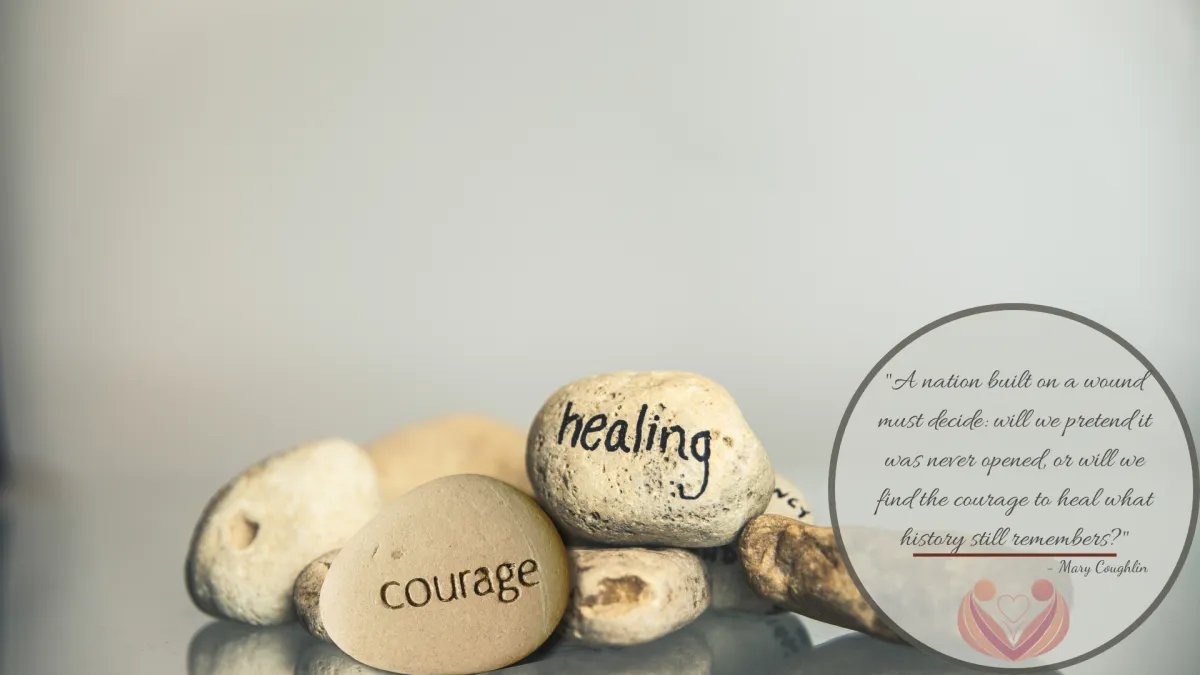
The Original Wound — Founding Ideals and Founding Violence
"A nation built on a wound must decide: will we pretend it was never opened, or will we find the courage to heal what history still remembers?" — Mary Coughlin
The Original Wound — Founding Ideals and Founding Violence
Democracy and Development: The Parallel Truth
“We hold these truths to be self-evident…”
But they weren’t.
Not to the people who were enslaved.
Not to women.
Not to the babies born into chains, or the mothers who bore them with broken backs and broken hearts.
From its inception, America has told a story about liberty—while simultaneously engineering systems of domination. And that contradiction, that dissonance, that lie, is the original wound of our democracy.
Heather Cox Richardson, in her book Democracy Awakening, pulls back the curtain on the mythology we've inherited. She reminds us that our nation was never a finished product, but a proposition—a fragile and often violent experiment in self-governance. It has always depended on who gets to count as “we.”
And it is long past time we told the truth about how this wound has festered.
Democracy and Development: The Parallel Truth
As someone who works in trauma-informed developmental care, I see these patterns everywhere—in the smallest of bodies, in the earliest of moments.
Babies who are not protected, not soothed, not believed in—their nervous systems remember. They develop around the absence of care, just like our country developed around the absence of justice.
In the NICU, we have learned that pain denied does not go away—it imprints. Silence is not healing. And pretending we are “fine” because the baby survived is not the same as being well.
America is no different.
We have tried to build a national identity on top of unacknowledged trauma. We've called ourselves exceptional while refusing to account for our original sins: the genocide of Indigenous peoples, the enslavement of Black bodies, the exclusion of women and others from the social contract.
Like a baby left to cry without comfort, our nation has internalized abandonment, shame, and fragmentation. And it continues to play out—in our policies, our politics, and our care systems.
Reckoning is the Beginning of Repair
In trauma-informed care, we understand that naming the harm is a prerequisite for healing.
It’s not enough to be resilient. We have to be honest.
We must stop skipping the rupture and rushing to the recovery. We need to dwell, for a moment, in the wound—not to wallow, but to understand. To bear witness. To build the capacity for moral repair.
Because what if democracy is not just a structure of governance, but a way of relating?
What if it lives in every NICU, every courtroom, every family, every moment where voice, presence, and dignity can be either honored—or denied?
We begin to heal this country not through slogans or saviors, but through integrity in action. And that starts with the truth.
A Reflection Invitation
Where in your life—personal or professional—have you seen rupture masked as resilience?
What would it look like to begin again, but this time with truth at the center?
Next in the Series:
“Unfinished Business: Slavery, Reparations, and the Myth of Moving On”
Let us not be afraid of the wound.
Let us remember that healing begins not in forgetting, but in facing what was broken—together.
We were never meant to build a nation—or a life—on denial.
We are the ancestors of the future.
What we choose to acknowledge now will shape what becomes possible for those who follow.
This is where the repair begins.
This is where we remember who we were meant to be.
Weave on, my friends.
— Mary
P.S. If this post stirred something in you—if you feel the call to lead, to heal, and to care differently—you might want to explore the Trauma-Informed Professional (TIP) Certificate Program.
It’s where science meets soul meets skill—and where we train the people who will shape what comes next.
Explore TIP 2.0 here ➤ https://www.caringessentials.net/tip-certificate-program
